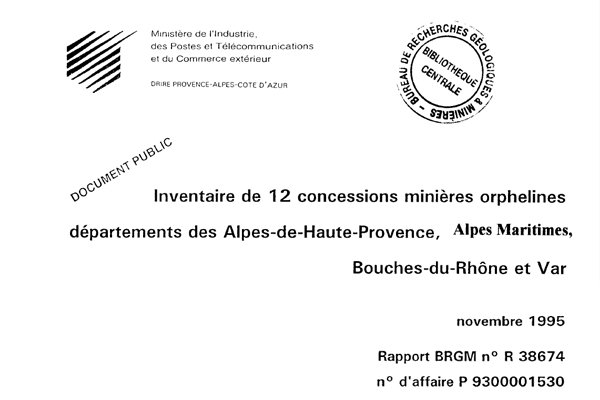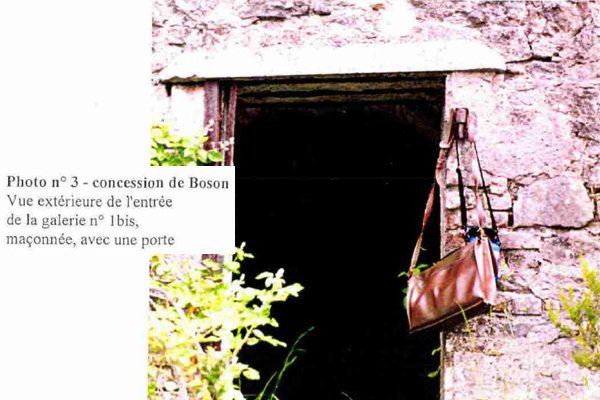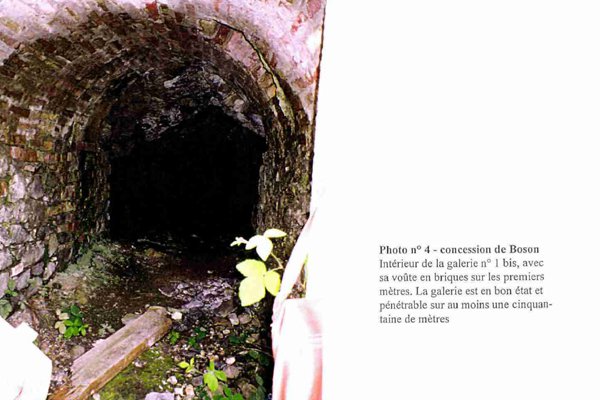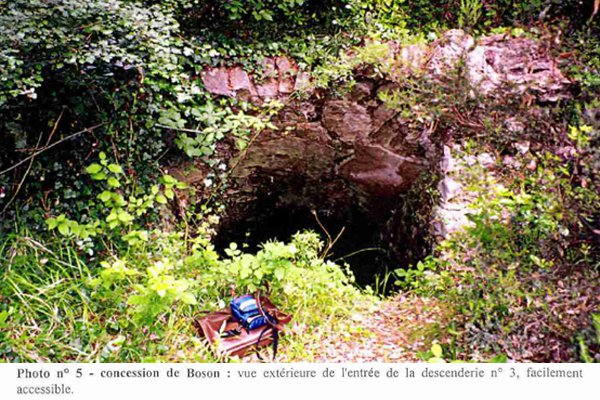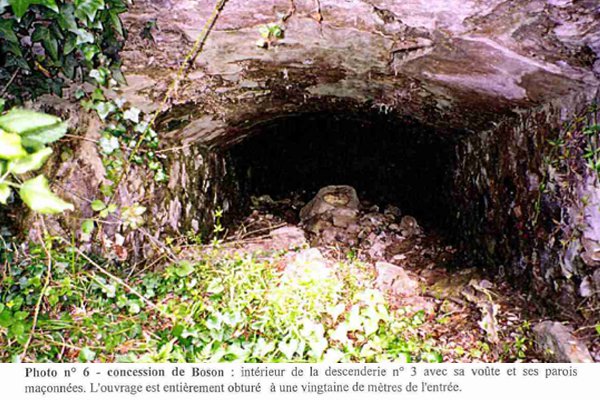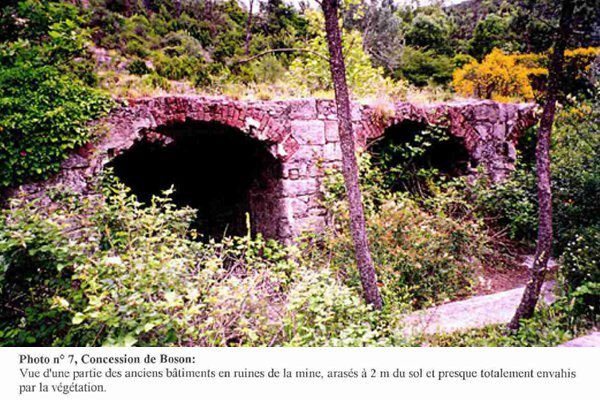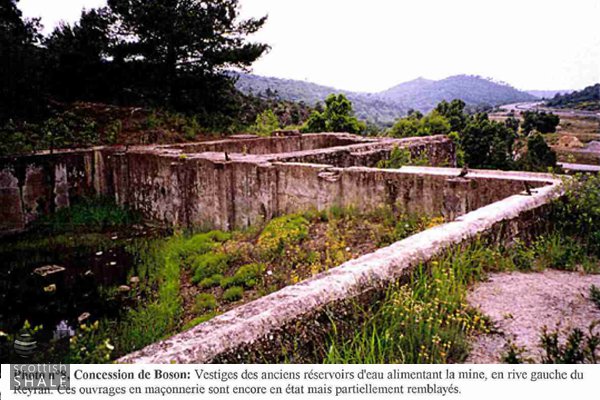Boson oil works, France
Broxburn Miners go to the Riviera
The Holmes shale mine was described as a “dangerous and unhealthy place”. From the pithead at Roman Camp, the mine plunged into the steeply inclined seams of Pumpherston shale that lay north of the Edinburgh to Bathgate railway. Difficult working conditions made life hard for mining contractors who were paid for the tonnage of shale they produced. In 1888, when the price of oil reached a new low, the small Holmes Oil Company felt it necessary to reduce the amount paid to its miners for each ton of shale produced. After a succession of cuts in price, the Holmes miners felt they had no option but to strike. For much of the year, a succession of bitter strikes raged, with accusations of victimisation by management, and talk of retaliation against “blacknebs”. In this toxic environment, it is hardly surprising that Holmes men jumped at the chance of free passage to the south of France and the opportunity to mine shale beneath the warmth of the Mediterranean sun.
Shale oil was produced in France twenty years before the first Scottish shale oil works. By 1848 “schistes bitumineux” were being worked at Boson, where seams outcropped along the side of the steep valley cut out by River Reyran. This centre of industry lay just seven miles north of the port of Frejus, not far along the coast from fashionable watering spots of Cannes, Antibes, and Monaco
It's unclear how the Boson Oil Company Ltd. came into being – perhaps it was the result of a chance encounter at a fashionable party? According to the company's 1884 prospectus, a new oil works had been built at Boson just a few years previously but it's proprietor had then died. Works, mines, housing and other necessities were already in place, the oil shale at Boson were much richer than that found in Scotland ,and the price realised for oil in France was much higher. Once £150,000 had been raised by the share issue, a healthy return on investment seemed inevitable.
The scheme had been pulled together by George Simpson, a plausible rogue who had his finger in most shale oil projects at that time. Simpson started out as proprietor of the Benhar collieries. During the 1870's he was a part of many shale oil partnerships, and during the 1880's specialised in assembling ambitious (and often fanciful) shale oil schemes that were promoted as public limited companies. These included hopeless schemes taken forward around the same time by the gullible boards of the new Lanark, Binnend, and West Lothian shale oil companies. Simpson was never shy of taking legal actions as well as being their subject, and several cases associated with the Boson company hints at shady share dealing. By the end of the decade Simpson's luck ran out, he was bankrupted, but subsequently started a new career as a coal master in South Wales, where he found a new pool of gullible investors.
The first board of the Boson Oil Company were mainly directors of the respected Dalmeny Oil Co. Ltd., however after little more than a year, and following little practical progress, they were replaced by a new board. Still no dividend was paid and the blame was placed on retaining the original management which was described as “putting old cloth in a new garment”. In 1888 it was agreed to wind up the Scottish-registered Boson Oil Co. Ltd., and set up a new company registered in England; the Frejus Oil Co. Ltd. Shareholders in the old company received a similar number of shares in the new company, although as part of a complicated legal deal this excluded the shares held by the troublesome George Simpson.
The surviving reports of the company's public meetings give a little insight into the company's operations in France. Initially the company had difficulty mining sufficient shale to feed its twelve retorts, although there was mention of using spare refinery capacity to process imported American crude oil. There are references to shale production at the “Aqueduct pit”, “Bridge mine” “No.5 pit” and a coal mine. It seems that the works were fitted with “rotary retorts” - a type not known in Scotland, but these were later replace with the Scottish type of retort.Quite a number of Scots seem to have moved to France to serve the works. The general manager was John Laing, previously works manager at Midlothian oil company at Straiton. John James Scott of the Lanark oil company was appointed cashier, although it was suggested that his knowledge of the French language “was not sufficient to enable him satisfactorily to perform the duties” and had to take his employers to court to release his wages. The Holmes miners departed for France at the end of 1888, when the new Frejus oil company were improving and extending operations. It was noted that “other tradesmen connected with oil works are to follow” Unfortunately this influx of experienced men was not sufficient to turn the fortunes of the company and in 1892, its the plant and assets were put up for sale. No doubt the Holmes men had already headed home.
This didn't quite mark the end of Scots shale men in the south of France. In 1918 Uroz Oilfields Ltd. - an English-registered company - acquired various French coal mining concessions. Renwick Cowan, formerly of the Pumpherston Oil Co. Ltd was their manager in France and conducted a detailed study of reserves at Boson. Plans to resume oil operations were progressed but never realised, although others continued to mine shale in the area to produce “houille et schistes” until 1944.
The precise location of the Boson oil company's works is not known, but any remains may have been obliterated following the catastrophic failure of Malpasset dam in 1959. In one of France's greatest disasters of the 20th century, a wall of water swept along the Reyran valley, killing 423.
A survey of mining remains in the area were conducted in 1995, which included ruins of some of the mines thought to have been worked by the Boson oil company. Part of the purpose of this report was to assess the best way of filling in old workings to make them safe, so sadly it might be expected that many of the remains pictued in the report no longer survive.
FRANCE - COAL and SHALE MINES .
Messrs Horncastle & Pember are instructed by the Trustee to the Debenture Holders to Sell by Auction at the Mart Tokenhouse Yard E.C. on Thursday January 26th. at Two precisely the Valuable CONCESSIONS of COAL and SHALE MINES with OIL MANUFACTURING and REFINING PLANT recently worked by the FREJUS OIL COMPANY ( LIMITED ) altnate in the Commune of FREJUS , district of DRAGUIGAN . VAR FRANCE . together with all the OUTBUILDINGS, LABOURER'S DWELLINGS , MACHINERY , PLANT &c. necessary for the complete carying out of the Mines . Particulars can be obtained at the Mart of Messrs. Simpson and Cullingford, Solicitors.
The Scotsman, 12th January 1892
.......
AGM COMPANY MEETING. UROZ OILFIELDS, LTD.
The annual ordinary general meeting of the Uroz Oilfields, Ltd., was held yesterday London—Mr H. W. Sillem presiding. The Chairman said: —You will no doubt be interested to have brief aocount the position of the affairs the Company. Our concessions in France were acquired in the latter part of 1918, and comprise full exploiting mineral rights over an area of 5616 f acres..........................................
I cannot very well close without a reference to the expected existence of oil shale in our concessions. With your permission I will read short extract from the report furnished to us by Mr Renwick Cowan, our manager in France, and formerly manager of Pumpherston Oil Co., Ltd. :— " To the south of this concession (approximately) 2.5 miles, and forming the southern extremity of Treyran basin, is situated the concession of Boson, containing valuable shale seams which are being exploited at present. Some few years ago extensive prospecting and development operations were executed under my direct supervision, and during that period careful and thorough investigation was made and valuable data procured. The tracing of the shale outcrops, northwards through the Madeleine concession the Frejus Nord boundary formed an important part of these operations." “From the data then obtained I am of opinion that the seams, found traversing the boundary are the Boson shale seams position, and will be found to extend into tho Frejus Nord concession. This opinion is based on the following:—(a) The similarity of inclination and ' strike,' (b) the presence of the distinctive enclosing rocks, (c) the similarity of the formation and characteristics of the seams, (d) the definite identification of the intervening ' ribs ' and ' layers.' "My long and extensive experience in practical shale mining has enabled me to identify the more readily and accurately the distinguishing features above delineated. The Boson shales are of extreme richness, far surpassing in quality and quantity of products that of the Scottish shale fields. The crude oil of exceptional richness, being practically free from sulphur." (Applause.) For the time being we have decided to concentrate all our energies on the excellent coal seams now being proved and opened up so to bring the Company to the profit-earning stage with the least delay possible.
Dundee Courier, 10th December 1919



